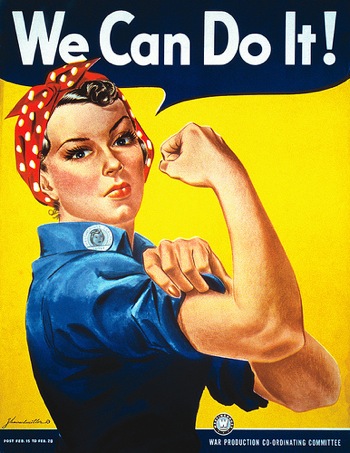Let's talk about "gender equality"


It’s undeniable that Venezuelan society is sexist.
From the silly facts – the women can flutter their eyelashes at male waiters to get an extra basket of bread, while men are [supposedly] better than women at changing tires – to the very real but horrible fact that a more than capable woman might not get hired when the potential boss finds out that she might want to have kids in the near future.
We’ve been asked time and time again if we ever felt discriminated for being women.
Honestly, we’re lucky because we’ve never felt directly discriminated… until now.
We are both economists, and during our 5 years of undergrad education, we had something like 40 different professors of which 9 were women and only one taught a core course (the others taught, if you will, instrumental courses). And it might sound kind of delusional, but we never bothered to take a real look at this … until now. It was not relevant. We assumed that professors were the best in their area, regardless of gender.
At the beginning of our professional experience, we never felt discriminated for being women. It was not an issue. Sometimes there is the notion that women are more organized and have a keen eye for detail. But that was pretty much it.
This year, for the first time, we felt discriminated.
We were invited to do a couple of interviews and presentations because we “are women”. In one case, we were specifically told that they needed to fill a gender quota.
While those who invited us commented that it was awesome to see women talking about economics in Venezuela, we wondered: if we were men, would they have invited us? We are not sure… but probably not.
After reading the first version of the post, Juan asked us: “But… have you ever not been invited because you are women?”. We really don’t know… but we hope not.
According to the World Economic Forum’s Global Gender Gap Report 2014, “people and their talents are two of the core drivers of sustainable, long-term economic growth. If half of these talents are underdeveloped or underutilized, the economy will never grow as it could.”
Therefore, every person -regardless of gender- should compete under the same standards and be paid on the same basis, allowing society to benefit from their talents. And this should also apply to the political sphere.
Now, the electoral authorities put the subject on the table… for the wrong reasons.
 “Gender equality” turned into a very popular topic, right after the electoral authorities approved the 40%-60% female-male min-max quotas for the parliamentary candidacy lists.
“Gender equality” turned into a very popular topic, right after the electoral authorities approved the 40%-60% female-male min-max quotas for the parliamentary candidacy lists.
There are many women in key positions inside the government. In contrast, the opposition has few women in key positions. We don’t agree with the governments’ ways, and the merits of its female combatientes are debatable, but many women are recognised as part of the chavista cúpula. In the opposition, most women tend to be in technical or instrumental positions -by choice or because they think is the “way in.” There are very few “female faces” of MUD. And let’s not forget the “first ladies”.
A few weeks ago Audrey posted “the government is using this [“full on gender equality” in the candidate lists] to hinder the elections, but look at the bigger picture, you should recognize that you have dropped the ball on gender issues”.
We totally agree: it is simply wrong to use gender equality to hinder the elections. But if MUD had more women on its ranks -not on support roles, but actual key positions-, the gender quota wouldn’t be a problem at all. It would only be another check in the requirements list.
Then again, there is a big difference between what is and what should be.
MUD should -like Audrey said- recognize that they “have dropped the ball on gender issues” and start being more open to women participation. And we are not talking about rallies to celebrate International Women’s Day or having the “first ladies” sit next to Chuo Torrealba during press conferences. We are talking about genuine female representation to defend issues like “same standards and same pay” for men and women.
But we, women, should also be asking ourselves: what can we do to play the political game in Venezuela? And even more so, what can we do to be treated as equals in the professional sphere?
A few seem to have found the formula, but can it be replicated? What would it take? Are we women willing to jump in, play the game and -why not- change the rules?
We think that the real fight should be in the “same standards and same pay” area, and not in the “gender quota” area.
 We should fight for better government policies, to help develop an environment where women’s participation –in business, politics, education, innovation and everywhere- is encouraged.
We should fight for better government policies, to help develop an environment where women’s participation –in business, politics, education, innovation and everywhere- is encouraged.
A good policy for gender equality should start by investing in women’s health and education, and Venezuela has a long way to go in this topic. Just to name a couple indicators from the World Health Organization: from 2000 to 2013, Venezuela’s maternal mortality ratio went up from 91 to 110 deaths per 100,000 births; and the country has the largest teenage birth rate in South America (101 per 1000 girls aged 15 to 19).
With healthy and educated women, the next step should be to guarantee they are able to join the workforce.
According to the International Labour Office (ILO), sex discrimination persists in Latin America and the Caribbean “and has an important impact on the employment problems of women. Although the gender gap in labour force participation declined slightly, the unemployment rate of women is still 1.35 times that of men, and underemployment (considering income and hours) is also higher among women. The situation is worse for young women, who constitute 70% of young people who neither study nor work. Young women unemployment rate reached 17.7%, compared with 11.4% of young men”. Also, “Informality affects mostly women and youth”.
We should promote non-discrimination in hiring, offer equal family leave for men and women, implement flexible working time for mothers and/or provide childcare assistance. We should also promote entrepreneurship amongst women, giving them better access to credit and technical training. There are many options and many success stories.
In the end, we just want to be known for our work and our well-deserved achievements.
Caracas Chronicles is 100% reader-supported.
We’ve been able to hang on for 22 years in one of the craziest media landscapes in the world. We’ve seen different media outlets in Venezuela (and abroad) closing shop, something we’re looking to avoid at all costs. Your collaboration goes a long way in helping us weather the storm.
Donate




